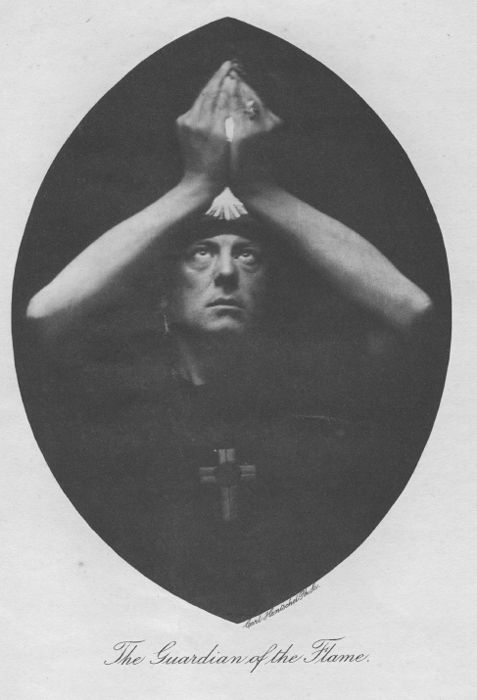
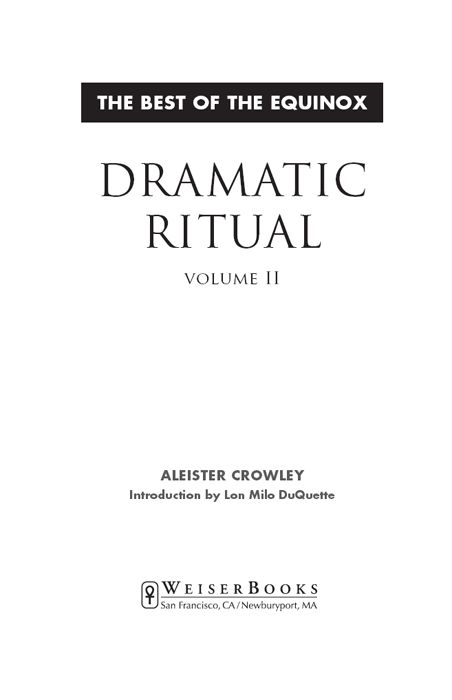 This edition first published in 2013 by Weiser Books Red Wheel/Weiser, LLC With offices at: 665 Third Street, Suite 400 San Francisco, CA 94107 www.redwheelweiser.com Copyright 2013 Red Wheel/Weiser. All rights reserved. No part of this publication may be reproduced or transmitted in any form or by any means, electronic or mechanical, including photocopying, recording, or by any information storage and retrieval system, without permission in writing from Red Wheel/Weiser, LLC. Reviewers may quote brief passages. Aleister Crowley material copyright 1912 Ordo Templi Orientis. All rights reserved.
This edition first published in 2013 by Weiser Books Red Wheel/Weiser, LLC With offices at: 665 Third Street, Suite 400 San Francisco, CA 94107 www.redwheelweiser.com Copyright 2013 Red Wheel/Weiser. All rights reserved. No part of this publication may be reproduced or transmitted in any form or by any means, electronic or mechanical, including photocopying, recording, or by any information storage and retrieval system, without permission in writing from Red Wheel/Weiser, LLC. Reviewers may quote brief passages. Aleister Crowley material copyright 1912 Ordo Templi Orientis. All rights reserved.
The right of Aleister Crowley to be identified as the author of this work is asserted. ISBN: 978-1-57863-542-9 Library of Congress Cataloging-in-Publication Data available upon request Cover design by Jim Warner Cover photograph Ordo Templi Orientis. Used by permission Printed in the United States of America MAL 10 9 8 7 6 5 4 3 2 1 The paper used in this publication meets the minimum requirements of the American National Standard for Information SciencesPermanence of Paper for Printed Library Materials Z39.48-1992 (R1997). www.redwheelweiser.com www.redwheelweiser.com/newsletter
CONTENTS
Images
Editor's Note: The text for this volume is taken largely from the original
Equinox materials, which were never published in one volume with consecutive page numbers. We have added our own consecutive page numbers and titles that correspond with the Table of Contents for this volume. Although not technically from
The Equinox, Crowley's essay
Of Dramatic Rituals makes a nice addition to this volume.
The essay Concerning Blasphemy was graciously supplied by the O.T.O, having been originally published in The Bystander during Crowley's staging of the Rites of Eleusis at Caxton Hall, London in 1910. It also appears in The Equinox, Volume III, Number X. We've made every effort to keep this publication as close to Crowley's original as possible. Deep gratitude to Lon Milo DuQuette and Hymenaeus Beta for their patience, kindness, and intellect.
INTRODUCTION
The World of Magick is a Stage
I grew up in the 1950s in a small town in eastern Nebraska. Looking back I realize how very lucky I was to come of age in an environment where the air was fresh, and the water (at least in those years) as pure as any place on earth. At the time, however, I didn't consider myself lucky at all; in fact, I felt trapped like a wild animal in a zoological garden run by well-meaning but totally inept, insensitive, (and perhaps even dangerous) zookeepers.
I was painfully isolated and felt as if I were the only person in town that engaged in any form of self-examination. I never really fit in with my peers. I refused to join my classmates as they joyously rode their bicycles through the fog of the DDT spray truck killing summertime mosquitoes; I rejected the ridiculous explanations of God, creation, and my own existence proffered with unquestioning conviction by my Sunday school teachers. Television would be my only link to the outside world a world of comedy and wit, art and music, ideas and drama. Thank God there was a movie theatre in town because the cinema transported me to an adult world of beautiful women and handsome men, and heroes and villainsadventures of the soul acted out in faraway places and times past and future. The theatre was for me holy ground.
It was my temple, my church, my university. Each Saturday and Sunday I worshipped at the altar of the silver screen. Movies delivered everything the church was supposed to deliver. They liberated, then elevated my consciousness; fired my imagination, ignited my libido, and brought me body and soul into the living presence of the gods. I yearned to be on the stage, and as I grew older auditioned for every school, church, and community production, play, and musical that presented itself. Contrary to what you might think, drama did not present an opportunity for me to escape or get out of myself but a chance to, for a few moments, be myself. As an adult, I would learn that there is real magical method to the Dionysian madness of dramatic ritual.
Indeed, every magical ritual is a sacred drama, complete with all the colorful elements that contribute to the power of great theatre: costumes, weapons, conflict, and most of all... love. Aleister Crowley was certainly not the first magician to recognize and exploit the power and potential of magical theatre, but he was arguably the most audacious in his attempts to squarely lay it undisguised in the lap of popular culture. The 1910 public performances of his Rites of Eleusis was a watershed moment in his magical career. These seven planetary ritual dramas deservedly form the centerpiece of this Volume II of The Best of the Equinox series. Indeed, these rituals could stand alone as a valuable handbook to the modern magician. In this book, however, the reader will also be treated to a wealth of additional collateral material and images gleaned not only from Equinox Vol.
I, including rare photos and sheet music from the original productions; the essays, such as The Earth; and J.F.C. Fuller's masterpiece, The Treasure House of Images; but also the introductory essay, The Rites of Eleusis: Their Origin and Meaning from Equinox Vol. III. To introduce it all we've also included Crowley's words about Dramatic Ritual from his magnum opus, Magick, Book IV. In my book, The Magick of Aleister Crowley I devote a chapter to Crowley's Rites of Eleusis which are seven dramatic rituals originally published in 1911 as the Special Supplement to The Equinox, Vol. I, No. VI. Space allowed me only to include a full version of one of those remarkable Rites.
I am delighted at the opportunity to now present to you all seven rites as they originally appeared in The Equinox. I append my introduction below. It is then, with the greatest of pride, pleasure, and magical excitement that I now signal to the stage hands to draw up the curtain on The Best of the Equinox, Vol. II, Dramatic Ritual.
Drama is also magickin fact, it is the oldest form of magick. We see elements of prehistoric dramatic ritual painted on the walls of caves and scratched upon the bones of extinct animals. The tragedies and comedies of the ancient Greeks were written to be entertaining and thought provoking but first and foremost they were religious observances (celebrated in the temple of Dionysus). We may not think of them as such, but the stage, the screen, even the television are magical temples.
As we watch and listen, we become living Triangles of Evocation. Laughter, tears, and terror are literally evoked into us by the magick of the play or film. The magical potential of drama was not lost on our ancestors. Knowing that only relatively few individuals of every generation are emotionally and intellectually equipped to master the natural and spiritual sciences, the hierophants of the past discovered that it was yet possible to bring a significant level of enlightenment to the masses. It was very important, for instance, for the working population of ancient agrarian cultures to know the best times to plant and cultivate their crops. However, for most of the labor force it really wasn't important (or even helpful) to understand the chain of astronomical events that affect the change of seasons.
Next page
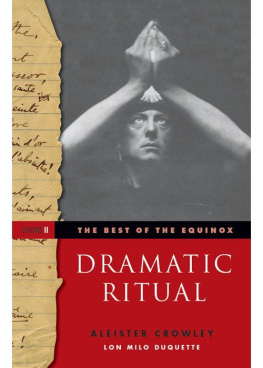
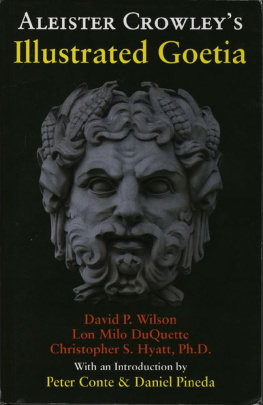
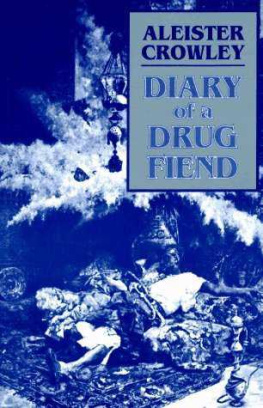
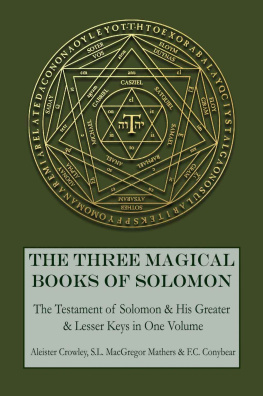
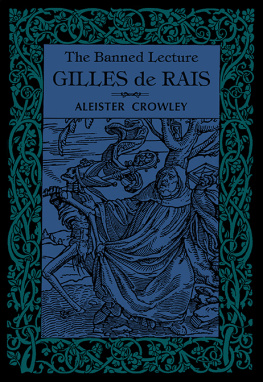

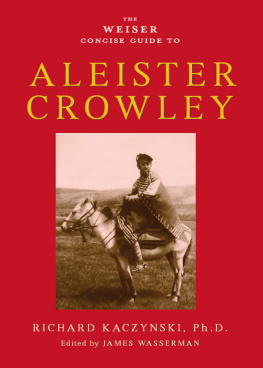
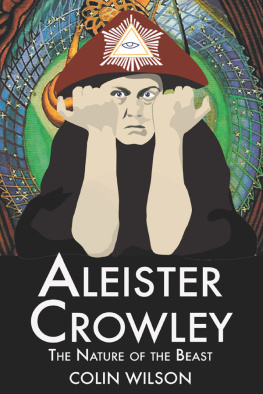

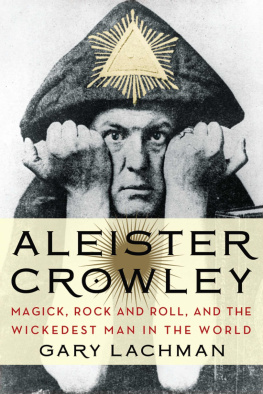
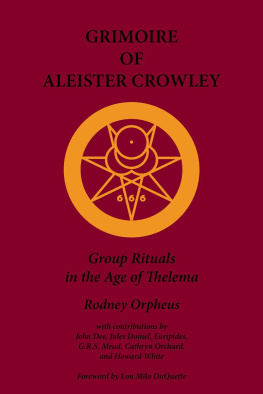
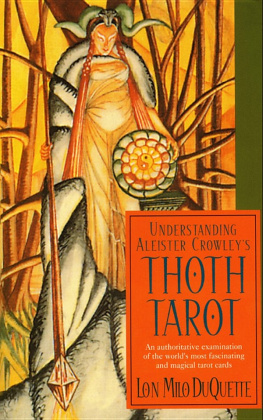
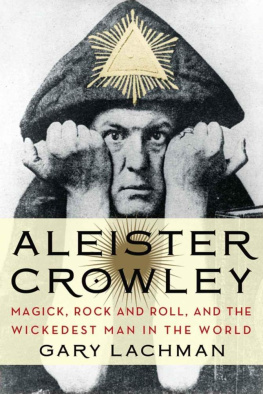

 This edition first published in 2013 by Weiser Books Red Wheel/Weiser, LLC With offices at: 665 Third Street, Suite 400 San Francisco, CA 94107 www.redwheelweiser.com Copyright 2013 Red Wheel/Weiser. All rights reserved. No part of this publication may be reproduced or transmitted in any form or by any means, electronic or mechanical, including photocopying, recording, or by any information storage and retrieval system, without permission in writing from Red Wheel/Weiser, LLC. Reviewers may quote brief passages. Aleister Crowley material copyright 1912 Ordo Templi Orientis. All rights reserved.
This edition first published in 2013 by Weiser Books Red Wheel/Weiser, LLC With offices at: 665 Third Street, Suite 400 San Francisco, CA 94107 www.redwheelweiser.com Copyright 2013 Red Wheel/Weiser. All rights reserved. No part of this publication may be reproduced or transmitted in any form or by any means, electronic or mechanical, including photocopying, recording, or by any information storage and retrieval system, without permission in writing from Red Wheel/Weiser, LLC. Reviewers may quote brief passages. Aleister Crowley material copyright 1912 Ordo Templi Orientis. All rights reserved.